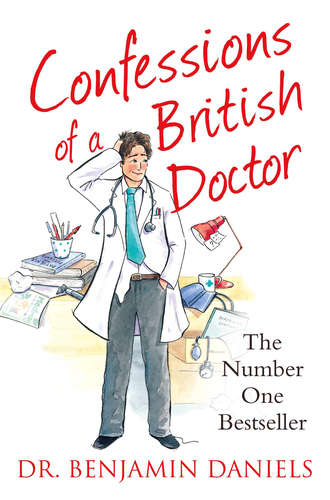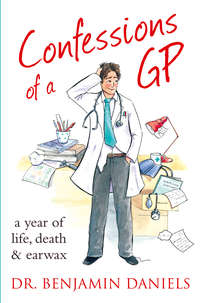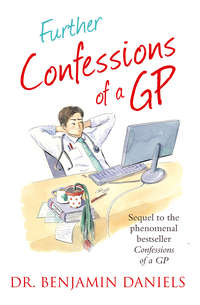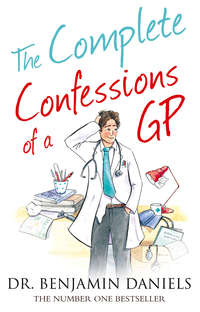
Полная версия
Confessions of a British Doctor
‘If you leave him and he harms himself, that’s not your fault.’
‘Is that the best you can do? He needs help.’
Andy was a patient at another practice and I had never met him. I couldn’t really speculate what he needed but psychotherapy is usually our get-out clause when faced with a difficult psychological issue that is complex and not fixed with a tablet.
‘Maybe psychotherapy would help Andy?’
Julia looked hopeful until I explained that there was a two-year wait for psychotherapy in this town.
‘That’s really useful, thanks a lot.’
‘You have to leave him,’ I said again. I tried to say it with compassion but I really did feel it was her only option. Julia got up, left and slammed the door. I clearly hadn’t handled that very well. I had failed again. Would another doctor have handled that better? What would a counsellor have said, or a priest or even bloody Jerry Springer? I was not sure if Julia would come back to see me. If she did, maybe next time I’d just listen.
Good doctors
What makes a good doctor? I seem to remember being asked something like this during my medical school interview. The interview panel yawned through my contrived answer that mentioned some naïve nonsense about being caring and good at working in a team. As part of our target-based existence, the patient plays a large role in deciding if we are good doctors or not. The government introduced patient satisfaction questionnaires as part of our performance targets.
During my training year I saw a middle-aged woman with stomach pains. I was very concerned and referred her urgently to the hospital because I thought she might have stomach cancer. She was seen and investigated within a week and turned out to simply have bad indigestion. When the snotty letter came back from the consultant, I was feeling a little red in the face. I had made an inappropriate expensive referral to the hospital and had caused unnecessary anxiety to the patient. I could just imagine the consultant grumbling into his endoscope as he cursed me for adding to his already busy day.
The patient and her husband, however, thought the sun shone out of my arse. ‘That wonderful Dr Daniels arranged for me to be seen so quickly.’ She bought me a very nice bottle of single malt to say thank you and told anyone who’d listen how fantastic I was. My poor medical judgement earned me a rather nice bottle of whisky and if my patient got to fill in one of the patient satisfaction questionnaires, I’d have been reported as the best doctor in the world.
Most medical practitioners have an idea whether they’re being good or bad doctors. On a Friday afternoon when I’m drained and tired, I know that I’m not giving my all. I try my best to remain professional but have to admit that I find it that bit harder to resist inappropriate requests for hospital referrals, sick notes and antibiotics. As GPs, we are supposed to be the ‘gatekeepers of the NHS’ but sometimes it can feel much easier to leave the gate permanently ajar rather than carefully defend the NHS hospital waiting lists by fending off the worried well. I’m very popular with my patients on a Friday afternoon because they are getting what they want, but I’m not always practising good medicine. Making the patient happy isn’t always the same as being a good doctor.
When I started as a GP I was told that it was easy to be a bad GP but hard to be a good one. A good doctor won’t prescribe antibiotics for a cold and won’t refer every patient with a headache for an expensive MRI scan. A good doctor should also be able to explain to the patient why he’s not agreeing to their demands, but sometimes, however hard you try, the patient leaves feeling dissatisfied and the doctor goes home feeling distinctly unpopular. It is a difficult balance to run on time but give each patient adequate individual attention, to allow patient choice but not give in to inappropriate demands, to keep referral rates low but make sure the patients get the expert input they need. I’m still not sure exactly what a good doctor is, but it is certainly more complex than earning a few smiley faces on a government questionnaire.
Connor
‘It’s my kids, Doctor. They’re little fuckers. I can’t control ’em no more. Something’s gotta be done about it. My youngest, Connor, was brought home by the police the other day.’
‘How old is Connor?’
‘He’s three.’
I rack my brains trying to think what a three-year-old could possibly do to get himself in trouble with the police.
‘They caught him putting rubbish through the neighbours’ letter boxes.’
‘Was he out on his own?’ I ask incredulously.
‘Oh no, Doctor, Bradley and Kylie was with him, but they was the ones telling him to do it.’
I skim through the notes to see that older siblings Bradley and Kylie are six and seven, respectively.
Mum Kerry is actually very likeable. She is a stereotypical council estate mum. Only 25, but already has three kids with three different men who are all now nowhere to be seen. Life is hard for her and she has very little support. She genuinely wants the best for her kids and really wants help.
Unfortunately for her, the entirety of my knowledge on child behaviour comes from having watched a couple of episodes of Supernanny on TV. I’ve never been the sternest of people and given the way my cat walks all over me, I’m probably not the best person to ask about discipline.
‘I think he’s got that DDHD condition. You know, where they’re little shits but it’s ’cause there’s something wrong with the chemicals in their brain and that.’
I’ve met lots of parents whose children have had a diagnosis of attention deficit hyperactivity disorder (ADHD). The parents love the label because it now excuses the bad behaviour. The kids run riot round my consulting room, rifling through my sharps bin and using my ophthalmoscope as a hammer. Mum and Dad do nothing to stop them and then say, ‘Sorry about the kids, Doc. It’s the ADHD – nothing we can do … brain chemicals and that.’
I don’t disbelieve that ADHD exists but perhaps it has been overdiagnosed in recent years. The main symptoms are lack of concentration, being easily distracted and not being good at listening. I could probably persuade myself that Connor has these symptoms, but I’m not sure that they are related to brain chemicals. I guess some children are more prone to developing these symptoms than others, but in most cases isn’t parenting more likely to be the most significant factor rather than a brain disease?
I’m not going to send Kerry’s kids to the child psychiatrist. The wait is long and I don’t want these children labelled as psychiatrically unwell. I’ve heard there is a specialist social worker locally who gives individual and group parenting skills classes. Kerry is perfect for her.
Kerry comes back a couple of weeks later to let me know how it went.
‘I really like my parenting support worker. She told me I mustn’t call ’em little fuckers no more but instead they are good children with some c.h.a.l.l.e.n.g.i.n.g behaviour.’
She goes on to tell me about how she is now rewarding good behaviour, setting consistent boundaries and using the naughty corner. Hold on a minute, I could have told her that. This parenting adviser must have watched the same episode of Supernanny that I saw.
Janine
Janine is nine years old and about 13 stone. She waddles into my room and then Mum waddles in after her. My room feels very small.
‘It’s her ankles, Doctor. They hurt when she runs at school. She needs a note to say that she can sit out games.’
‘Did you fall over or twist your ankle, Janine?’ I always try to engage with the child themselves if possible. Janine looks at the floor and then shakes her head. ‘How long have they been sore?’ Eyes still to the floor, this time I get a shrug.
‘Right, let’s have a look at these ankles then.’ I try to be engaging and smiley, stay positive and encouraging. I prod and poke her ankles and get her to move them around a bit. My examination is a bit of a show most of the time and today is no exception. One look at Janine walking into my room showed me that her ankles were basically normal. I try to make my prodding and poking look like it has purpose, but it is purely a performance for the benefit of Janine and her mum. I want them to think that I am taking them seriously, that I am genuinely looking for some ‘underlying ankle pathology’. As I prod away, I try to remember the names of some of the ankle ligaments … no joy there. Perhaps I’ll just try to remember which is the tibia and which is the fibula … no, just confusing myself now.
‘Right … Well, I can’t find any swelling or tenderness in those ankles … and she’s walking okay …’ This is the make or break moment … How am I going to put this tactfully? I am standing at the top of the diving board but do I have the bottle to make that jump? I could just write the note, prescribe some Paracetamol syrup and climb quietly down the ladder. No, Daniels, come on, it’s your duty to say something. Right. Here goes. ‘Some children find that … erm err … that being a bit … erm …’ (Say it, Daniels, just say it) ‘… erm overweight can make their joints hurt sometimes.’ I had done it. I had jumped!
Janine’s mum looks me straight in the eye. Her face looks like a pitbull slowly chewing a wasp. ‘It’s got nothing to do with her weight,’ she says angrily. ‘Janine’s cousin is as skinny as a rake and she has problems with her ankles, too. It’s hereditary.’
What can I say to that? My courageous leap got me nowhere. I belly-flopped painfully. Can I prove that Janine’s ankles hurt because she is fat? No. Is Janine’s mum going to accept that weight is an issue? No. I either argue on fruitlessly or accept that I am beaten and salvage the few scraps of the patient–doctor relationship that are still intact.
‘She can still do swimming!’ I shout as they waddle away, sick note and paracetamol prescription already tucked snugly into Mum’s handbag. It is a final attempt to redeem myself, but a poor one. I can picture Janine sitting in the changing rooms munching on some crisps while the rest of her class runs around outside. Beneath the many layers of abdominal fat, her pancreas would be slowly preparing itself for a lifetime of insulin resistance and the debilitating symptoms of diabetes that occur as a result. Meanwhile, her joints, straining under her weight, would be struggling to cope and the resulting damage would eventually develop into early onset arthritis.
Did I miss my chance to make a difference? Have I been a shit GP again? Are doctors slightly egotistical even to consider that a few well-placed words of advice from us can breach deeply entrenched lifestyle and dietary habits? ‘Hold on, kids, no more sugary drinks and turkey twizzlers for us. Dr Daniels thinks we are overweight and thank goodness he pointed it out or we would never have noticed. He’s given me a wonderful recipe for an organic celery and sunflower seed bake and we’re swimming to France at the weekend.’
Saving lives
A few years back I spent a stint working in a hospital in Mozambique. Each morning the American consultant would start the ward round with a prayer and then shout boldly and, with not the slightest hint of irony, ‘Come on team, let’s go save some lives!’ The rest of us would then cringe internally, roll our eyes at each other and then follow him round the morning’s array of sick and dying Africans. There are a surprising number of Western doctors filing around the wards of African hospitals. I’m not always sure of the motives but there we were: an American cardiologist, two British GPs and a French nurse. Between us, we had years of expensive medical training and lots of letters after our names. As we wandered through the wards, we didn’t really save many lives. The majority of our patients were dying of AIDS-related illnesses or malaria. There were no anti-AIDS drugs (antiretrovirals, ARVs) and even our malaria medication supply was low because of a robbery at the hospital pharmacy (an inside job).
Meanwhile, 30 miles outside of town, Rachel, a 22-year-old from Scotland with no letters after her name, really was saving lives. Rachel had dropped out of her sociology degree and had been working in a call centre before deciding to come and do some voluntary work in Mozambique. She had raised some sponsorship from back home and was touring the rural villages with a troop of local women. All she had at her disposal was a basketful of free condoms and a few hundred subsidised mosquito nets. Accompanied by information and education in the form of songs and posters, her campaign was a raging success. She later e-mailed me to say that malaria deaths had reduced and that she was hoping to have an equally good result with HIV transmission rates.
At the same time, my learned colleagues and I made clever diagnoses on the ward and skilfully inserted chest drains and spinal needles. Occasionally, we did save a life and it was quite exciting when a patient got up and went home after being at death’s door. As we waved them off, we knew that ultimately they would be back. They couldn’t afford to pay for the full course of medication, and it was only a matter of time before they were unwell again and back in our hospital. We were briefly prolonging lives rather than saving them.
Regardless of the country it is practised in, most of hospital medicine is painting over the cracks rather than fixing the wall. Lives are saved by preventing illness rather than curing it. If you are 64 and admitted to hospital in the UK with a heart attack, it will be all blue lights and running around. After emergency heart scans, a dashing young doctor will probably give you a whack of clot-busting medicine into your veins and it could save your life. At age 16, this was just the kind of exciting medicine that I imagined my job would be. I have been that doctor and at times it is genuinely quite glamorous and exhilarating. Sometimes, it does make a real difference and lives are saved. The patient and family will thank you and you’ll feel pretty good for a bit.
Конец ознакомительного фрагмента.
Текст предоставлен ООО «ЛитРес».
Прочитайте эту книгу целиком, купив полную легальную версию на ЛитРес.
Безопасно оплатить книгу можно банковской картой Visa, MasterCard, Maestro, со счета мобильного телефона, с платежного терминала, в салоне МТС или Связной, через PayPal, WebMoney, Яндекс.Деньги, QIWI Кошелек, бонусными картами или другим удобным Вам способом.





